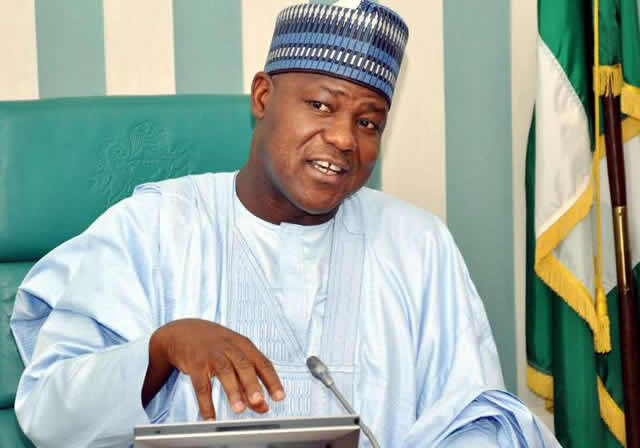
The Speaker of the House of Representatives, Hon Yakubu Dogara, has said corruption is not something that can be “totally” eliminated in any nation, including Nigeria, just like other vices, adding that what the government can do is to reduce it to the barest minimum-to a level that is almost seen as non-existent.
The speaker who stated this during an interactive session with some senior editors in his office in Abuja, said advanced countries that some commentators speak so glowingly about have not been able to eliminate corruption completely.
‘’We have seen this hydra-headed monster called corruption rearing its head even in elections of certain jurisdictions. Clearly the signs are there, but our collective effort is that we reduce it to the barest minimum. Anyone who thinks he can eliminate corruption; I lack the English word to describe such a person.
‘’To eliminate it (corruption) totally will amount to eliminating the totality of the human race; because no human being is clothed in perfection; all we can do is to reduce it to the barest minimum,” he stated.
Drawing analogy from some countries that have death penalty against vices like armed robbery and other crimes, yet failed to prevent armed robbery, Dogara said it is very difficult to phantom the nature of the human minds.
He added: “As they are executing armed robbers, some people still continue without care. Even when they are executing drug traffickers in some countries, more people are still peddling drugs. It’s a battle that we’ll continue to fight. There won’t come a day when Nigeria will say we have eliminated corruption, this is a perfect society, that is one notion we must discard.
‘’If we are ever going to achieve that, then there won’t be need for institutions like EFCC, ICPC, even the police-they have been fighting crime since the age of Nigeria, but there are still crimes.’’
Talking about the perceived huge corruption in the National Assembly, the speaker explained that the Nigerian parliament is not an institution that exists on its own, saying it is part of the society and it is difficult not to trace any iota of corruption in its affairs.
He said there could be cases of corruption in the parliament, adding that whenever the institution discovers such vices, proper punishment is apportioned to express dissent capable of deterring such.
Dogara said the National Assembly could override President Muhammadu Buhari if he vetoes the Nigerian Peace Corps bill which seeks to make the private organisation an agency of government.
The speaker said the National Assembly believes the peace corps would bolster Nigeria’s current security and law enforcement capabilities.
“If the president doesn’t assent for whatever reason,” to the Peace Corps Bill, “we are at liberty to recall it back to parliament and muster the two-thirds in the House and Senate and pass in spite of Mr. President’s veto,” Dogara said.
He, however, said any action to be taken by the lawmakers would be determined by Buhari’s reaction to the bill, already passed by each of the chambers of the National Assembly.
The Speaker said the parliament would not be distracted by the antics of existing security agencies, adding that the country cannot spend too much on security.
“We cannot overspend on the issue of protecting the lives and the properties of our citizens, we cannot,” he said.
Dogara said the police and other security agencies were acting in a manner similar to how they treated the Nigeria Security and Civil Defence Corps (NSCDC) in the run up to its adoption by the Olusegun Obasanjo administration.
The Head of Service of the Federation, Independent National Electoral Commission (INEC), National Security Adviser, Ministry of Interior and the Federal Ministry of Health joined other security agencies to kick against passage of the peace corps bill in the National Assembly last year, citing issues from lack of sufficient funds to duplication of duties.
Most of them opposed the establishment of the NSCDC, and its founder, Ade Abolurin, was arrested on numerous occasions.
Today, Dogara said, the NSCDC has become a force for good in the country, perhaps even more than the police.
“That was the same argument when the Civil Defence Bill was before the House, that it could not be funded, that they were divulging some of the powers of the police to the civil defence— that it would never work.
“At the end of the day all these were surmounted and now we have the civil defence that in some cases some citizens have said that they are more dependable than the conventional police.
“I see them everywhere I travel to and they have become a pride of the society,” Dogara said.
END

Be the first to comment